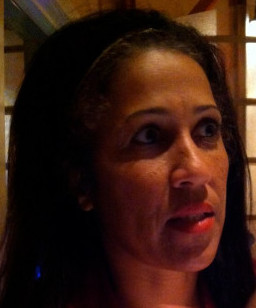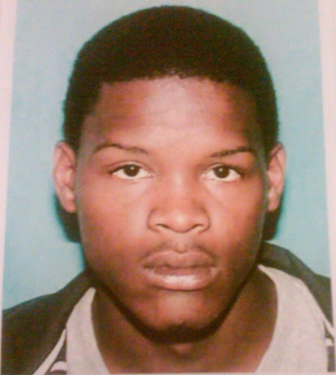
Deb Cotton has been in University Hospital since she was shot while videographing a second line parade on Mother’s Day — one of 19 victims of a 19-year-old apparently trying to wreak vengeance on a rival in the parade. After numerous surgeries, Cotton is out of intensive care. At least several more months in an extended care facility lie ahead. The Lens visited with her Wednesday evening. Here, edited for clarity and conciseness, are her reflections on what she — and the city — are going through.
The moment before I was shot I had a surreal vision. I saw the shooter with the gun in his hand no more than 10 feet from me but he looked just like my nephew Austin, a young man I’ve helped raise off and on through some very tough circumstances. Austin, whom I love very much and who couldn’t make me more proud, had just graduated from college the day prior.
I was looking at the shooter, but there was Austin: same hip-hop clothing, same body motion. Then I saw the shooter’s face, then Austin’s again. It was Austin with a gun; Austin second-lining; Austin shooting. It was like the shooter and my nephew were the same person. And now I understand the message the universe was telling me in that surreal visual: They actually are the same person.
That young man who shot me is all our young men. He’s us. All those young men that we’re throwing into prison, those young men who are killing us, the ones we’re demonizing — they’re us. We made them. We raised them. (Or didn’t.)
Maybe it’s too late for the young man who shot me. Maybe he’ll spend the rest of his life in jail. But we can change what’s happening out on the streets. We have the resources to deal with this problem. We always have. What we’ve lacked is willpower.
Where we’ve screwed up is in letting our gatekeepers, our political leadership, take advantage of the least of us. We turned away when homeless men and women became as familiar as fire hydrants and homelessness became acceptable. We winked and looked the other way as cronies of Congressman Bill Jefferson looted charity and support programs meant for underserved neighborhoods. (Is it any surprise that the communities most ripped off by such schemes are the areas where we’re seeing the most murders and violence?) By not drawing a line in the sand against these leaders who take from those who can’t speak up, we ensure our downfall.
We pay our taxes for these programs that are supposed to support people who have less than we have, and when politicians build stupid programs with the money or fly off with it in their pockets, we yawn. That makes us culpable in the murderousness that has us all so alarmed.
Everyone says enough is enough, but the city keeps barreling down the same murderous road to the same murderous outcomes. We won’t get change until people stop being so deferential to politicians, until we start demanding accountability for the money.
Funds pour in from all over the place, and what happens to them? Where’s the accountability? Until we face down these political monsters, we’re going to continue to churn out these alienated, violent criminals.
Money can be strategically invested to save and rehabilitate many of these young men. All of them? No. But this is a small town, not a sprawling metropolis like Los Angeles, where I come from. Take the whole population of black males between, say, 13 and 30 years — the target demographic. Pull out the ones at risk, the troublemakers, and you’re looking at what, 1,500 kids? We know who these people are. Assign every one of them a case manager. And start getting them everything they need.
They’re so crippled; their needs are so great, and it’s not just about job training. You need a lot of different skills to make it through life: how to read; how to parent; how to maintain composure around a difficult boss; how to deal with your own son when he comes to you with problems. There are organizations here that know how to impart those skills. And instead we throw money at fake programs run by well-connected pastors and their political cronies?
I’m no Pollyanna. I’m not saying this is so easy that why didn’t someone just do it, already. But, yes, I’m saying that solutions are not as hard as we’re making them out to be. Our lack of willpower is undeniably wrapped up in fear of the Black Man and getting too close to him, being the first to reach out. It means taking an approach that’s not easy and, for some, not popular. It means saying, I’m taking responsibility for helping this part of our society start to heal.
For those who can’t re-enter the community with us, there are progressive strategies for criminal justice. We know what they are: alternative sentencing programs, restorative justice, earlier intervention — but we haven’t committed to do them. Instead we keep throwing kids into prison, knowing that prisons as badly run as the Orleans Parish lockup are good for one thing only: turning young men into angrier and more skillful criminals. They’re factories.
We’ve welcomed input from the Vera Institute and other experts. They’re developing new standards of criminal justice. We officially adopt these ideas but then use almost none of them. Awhile back, moves were made toward turning prostitution and possession of small amounts marijuana into misdemeanor offenses. But Police Chief Ronal Serpas has already tried to get them rolled back. We can’t even get reforms in place before they try to tear them down.
Everyone says enough is enough, but the city keeps barreling down the same murderous road to the same murderous outcomes. We won’t get change until people stop being so deferential to politicians, until we start demanding accountability for the money, until resources are applied to programs that we know can make these young men whole.
Those who are sick of poverty and its problems, OK, move to Mandeville. But if you want to live here in New Orleans, you’ve got to continue to invest in the lives of these young men who have been left behind, left out.
NOLA for Life? Go out in the street and ask a young brother about it. He won’t know what it is, let alone how to work the programs to get the help he needs. If people would be more afraid of continuing down the path we’re on that than of pissing off the mayor then we might begin to see some serious changes with these young men.

What should happen to the one who shot me? I don’t know. Maybe it’s too late for him. He’ll probably get a lot of time. Maybe most of his life will be spent in jail. I would like to meet him, talk to him, connect with him some kind of way. I feel bad for him throwing his life away like that over a momentary bad decision.
As for myself, everything happens for a reason. After I came to and realized I could wriggle my toes, that I wasn’t paralyzed, I said to myself, OK, I’m still here. Now what do I do? Why did this happen to me? Not, “Poor me, why didn’t this happen to someone else?” But, “What was the reason this happened? Where do I go with it?” The answer is that I need to be part of the salvation of these young black men. So do you. So do all of us.
I remember one of my very first experiences in New Orleans. I had just staggered onto a Canal streetcar with all these packages in my hands, from shopping. And there was this young man sitting on the front bench, straight out of the Iberville, with tattoos on his neck and half his head braided, very antisocial looking like he was high on heroin. All of a sudden he’s helping me with my packages as best he can and giving me his seat. I was stunned. Flabbergasted. And the next thing I knew he had settled back down near this uptight looking white guy and they’ve started talking about the Saints.
I love that about New Orleans and I remember adding that to the list of the reasons why this city is right for me. But I was thinking too that if that young man had caught a few more breaks in life, had more support, more educational opportunities, got his hair together, maybe a few less tats, he’d could have more opportunities, more of a future.
Like my nephew Austin has now.
This story is excluded from The Lens’ standard offer to allow anyone to republish our stories. However, the author may grant rights to republish, and The Lens can pass along any such requests to the author.

